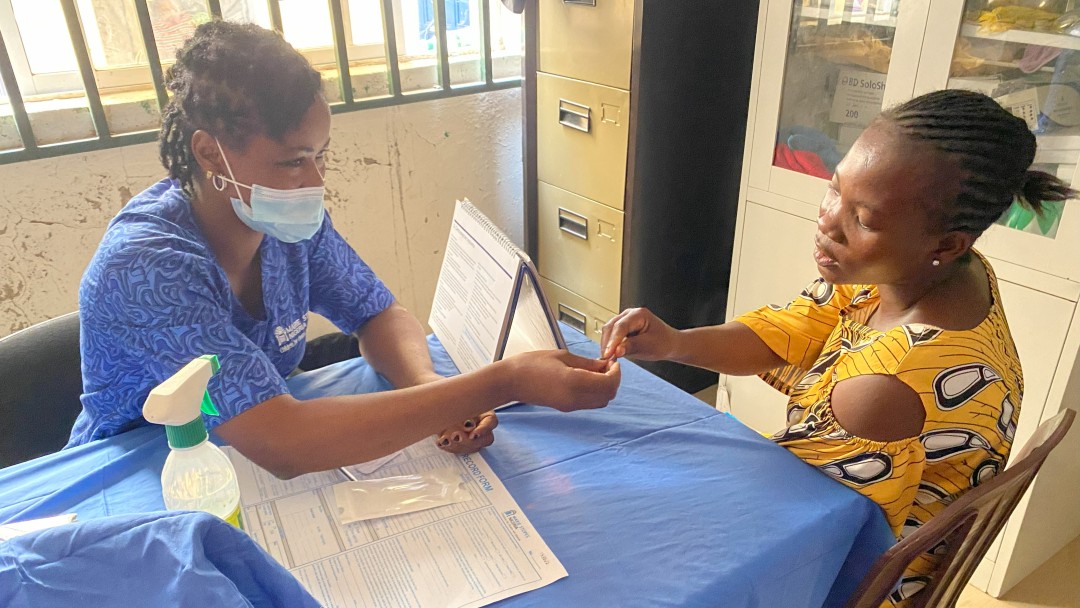Tip: Activate javascript to be able to use all functions of our website

Nigeria is a country with a young, growing population. Currently, many women do not have access to family planning services or are insufficiently informed. KfW is financing a reproductive health project on behalf of the German Federal Government. This includes help in cases of sexual violence. The project promotes the sexual and reproductive health of 2 million people, in particular women, girls and their partners.
The project creates a safe space for women to talk about contraception, even in remote villages in Nigeria. This is achieved by educating mobile healthcare teams trained by the non-governmental organisation MSI Reproductive Choices Nigeria on safe methods of contraception and hygienic menstrual management. Women in Nigeria have so far had little opportunity to make their own decisions about family planning. Of the 214 million women without access to contraception worldwide, almost 50 million live in Nigeria. Sexual and reproductive health and rights (SRHR) are significantly worse in Nigeria than in comparable African countries. On average, a woman in Nigeria has more than five children. Mothers are around 70 times more likely to die during childbirth than in Germany.
Up to now, many women and girls knew too little about sexual health and their rights. Furthermore, sex education is not taught at school. In addition, healthcare facilities often do not have enough qualified staff to provide women with adequate advice and treatment. Public health institutions where the supply of contraceptives is free of charge do not have sufficient stocks. Many women and their partners cannot afford expensive contraceptives from pharmacies, especially given that half of the country’s population lives on less than USD 2.15 a day. At the same time, one person in every two is under 24 years old.
The Nigerian government wants to initiate a demographic turnaround and needs support in doing so. This includes improving the health of mothers and babies, for example by increasing the gap between births and preventing unwanted pregnancies.
KfW supports these efforts and is financing a reproductive health and pandemic resilience programme on behalf of the Federal Ministry for Economic Cooperation and Development (BMZ). The goal is to help ensure that as many women and girls as possible in the project area have access to contraception and are familiar with the corresponding contraceptive methods. This is where the non-governmental organisation MSI Nigeria comes into play. The NGO works in Nigeria with 628 public health centres, numerous mobile teams and 40 health assistants as part of the KfW-funded project.
Overall, the project integrates a wide range of topics that address the needs of young people. These include preventing unwanted pregnancies, after-care following abortions, screening for cervical cancer, and menstrual hygiene.
In the project area, the five Nigerian states of Kebbi, Zamfara, Katsina, Adamawa and Taraba, the project works with health ministries, civil society and religious and traditional leaders, for example with organizations such as the Muslim women’s network FOMWAN. This gives the project greater acceptance.
The skills of state health authorities are being bolstered, for example through further training of staff. The project supports public health institutions in offering qualified services relating to reproductive health, primarily tailored to young people. In remote, rural regions, mobile teams provide education, awareness and service delivery especially for low-education women. Contraceptives are also dispensed, supported by social marketing. The project also promotes awareness-raising measures and dialogue formats for the prevention of gender-based violence and counselling for victims of sexual violence.
The project is already having an impact: over 2 million people have so far been reached with information and SRHR services via various communication and service channels. The project's various measures have helped to prevent an estimated 1.4 million unplanned pregnancies, around 580,000 unsafe abortions and over 7,300 maternal deaths. The project thus contributes to achieving UN Development Goals 3 (Good health and well-being) and 5 (Gender equality).
Share page
To share the content of this page with your network, click on one of the icons below.
Note on data protection: When you share content, your personal data is transferred to the selected network.
Data protection
Alternatively, you can also copy the short link: https://www.kfw-entwicklungsbank.de/s/enzByiFq
Copy link Link copied